Germany Further Restricts Ties With Islamic Republic
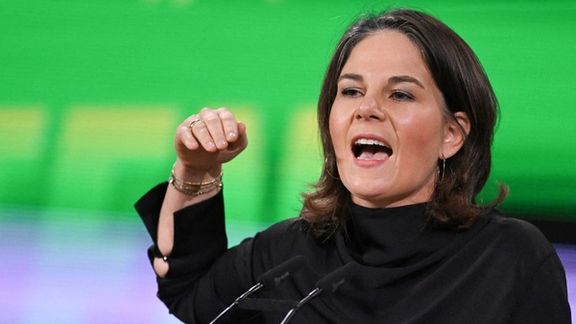
Germany is mulling over more restrictions for entry of individuals affiliated with the Islamic Republic beyond an already announced EU sanctions package over Tehran’s human rights violations.

Germany is mulling over more restrictions for entry of individuals affiliated with the Islamic Republic beyond an already announced EU sanctions package over Tehran’s human rights violations.
Foreign Minister Annalena Baerbock said in a statement on Wednesday that in future, visas will be issued to holders of service and diplomatic passports only where absolutely necessary, and additional entry restrictions will be imposed on members of Iranian organizations listed by the European Union.
Noting that Berlin is adapting its relations with the Islamic Republic in accordance with the new developments, she said, "There can be no 'business as usual' in bilateral relations with a state that treats its own citizens with such contempt for human rights." She added, “Day by day, the regime acts more brutally” against antigovernment protests, ignited by the death of the 22-year-old Mahsa Amini in hijab police custody.
“We are suspending existing bilateral dialogue formats, critically reviewing the few remaining instruments in trade and financial relations and reducing the presence of cultural mediators working in Iran, '' she said.
“We are preparing further EU human rights sanctions and checking the listing of relatives of those responsible,” she added, calling for consequences for them.
She also said evidence must be collected on the Iranian regime’s atrocities, expressing support for a special human rights council and other NGOs in documenting the crimes.
Baerbock also promised protection programs for particularly vulnerable Iranians from the areas of culture, science, media and civil society
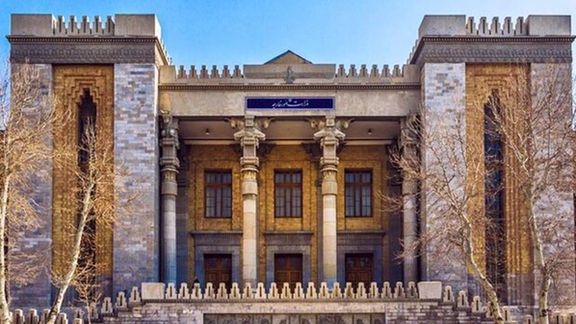
Iran has announced a new set of sanctions against institutions and individuals in the European Union, alleging that they incite violence in the country.
In a statement released on Wednesday, Iran’s Foreign Ministry again condemned the EU’s October 17 sanctions targeting Iranian individuals and entities over their role in the brutal suppression of peaceful protesters, calling the punitive measures a clear example of interference in Iran’s domestic affairs.
The ministry claimed that the Islamic Republic’s sanctions were imposed due to “deliberate actions in support of terrorism and terrorist groups, encouraging and inciting terrorism, violence, and hatred, which has caused riots, violence, terrorist acts, and human rights violations against the people of Iran.”
Iranian authorities, including the Supreme leader and the president, accuse Western countries and Israel of being behind the current wave of antigovernment protests, ignited by the death in custody of 22-year-old Mahsa Amini.
The new list of sanctions includes the Friends of Free Iran and the International Committee in Search of Justice (ISJ) and their members -- two informal groups in the European Parliament, in addition to Stop the Bomb, an organization advocating sanctions on Tehran with the stated goal of preventing it from acquiring nuclear weapons.
The Persian-language services of Germany’s Deutsche Welle and France’s RFI were also sanctioned, extending Iran’s animosity against foreign-based channels that it says are promoting an uprising such as BBC Persian and Iran International. Two directors of the German newspaper Bild were also blacklisted.

Two New Zealanders who had been detained in Iran for the past few months have recently been allowed to leave the country.
New Zealand's Foreign Ministry announced the news on Wednesday without any further details about the two travel bloggers, identified as Topher Richwhite and his wife Bridget Thackwray of 'Expedition Earth'.
Also on Wednesday, the New Zealand government updated its travel warnings for Iran and urged New Zealanders currently there to leave the country, which is convulsed with antigovernment protests ignited by the death in custody of 22-year-old Mahsa Amini. Wellington also reiterated its call for restraint by the Islamic Republic’s authorities in responding to the demonstrations, and for greater protection of women's rights and freedom of expression.
Amid nationwide unrest and widespread arrests, several foreigners visiting Iran have disappeared, confirming earlier reports that the Islamic Republic is taking foreign citizens hostage.
Earlier in the day, The Associated Press reported that a Spanish man trekking from Madrid to Doha for the 2022 FIFA World Cup has not been heard from since the day after he crossed into Iran three weeks ago.
Tehran claims it has detained over a dozen foreign nationals since the current wave of protests began, and authorities keep repeating that the turmoil is incited by other countries. During a weekly press briefing, Iran’s judiciary spokesperson Masoud Setayeshi said more foreign nationals have been arrested in what he calls, the “case of the French spies,” adding that the newly detained individuals have been accused of “conspiracy and collusion”.
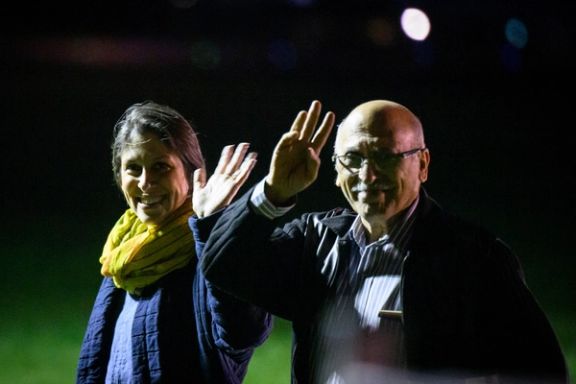
By Emma Batha Below we reprint an interview with former hostage in Iran, Nazanin Zaghari-Ratcliffe published on October 26 on the ongoing protests in Iran. Her insights shed more light on the prevailing situation.
---------------------------------------------------------------------------------------------------------------------------------------
Protests engulfing Iran have reached a point of "no return" as demonstrators demand wide reforms beyond the end of mandatory hijab rules, said British-Iranian charity worker Nazanin Zaghari-Ratcliffe, who spent six years detained in Tehran.
She said the Islamic government's crackdown on the popular revolt and shutdown of the internet showed it was scared of losing control.
"The anger has been building up for many, many years," said Zaghari-Ratcliffe as demonstrations raged for a sixth week, triggered by the death in police custody of 22-year-old Mahsa Amini after she was accused of wearing her headscarf improperly.

"We can see a coming together for one single goal, and that is freedom. The protests are really, really powerful this time. I don't think we've ever seen the unity we're seeing now," said Zaghari-Ratcliffe, describing Amini's death as the "spark for an explosion".
The protests have grown into one of the boldest challenges to the Islamic Republic since the 1979 revolution even if they do not appear close to toppling a government that has deployed its powerful security apparatus to quell the unrest.
"There is a generational shift which plays a massive role in the new movement," said Zaghari-Ratcliffe, who works for the Thomson Reuters Foundation as a project manager and will address the charity's annual Trust Conference on Wednesday.
"This is the generation of social media and TikTok and the internet. They know more about the world and their rights than we did. They have a lot more courage than we did."
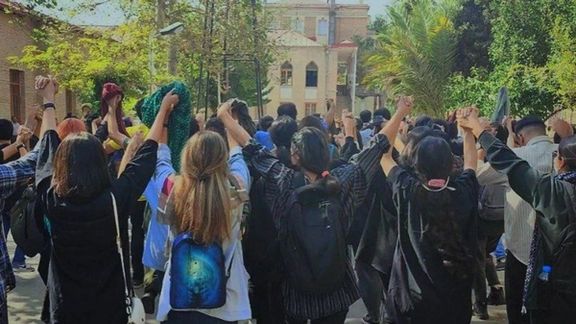
The uprising has seen women tear off and burn their veils, with crowds calling for the downfall of Supreme Leader Ayatollah Ali Khamenei.
Thousands have been detained by security forces and more than 200 killed including children, according to rights groups.
Solitary confinement
Zaghari-Ratcliffe, 43, was arrested at Tehran airport in 2016 after a trip to see her parents with her then 22-month-old daughter Gabriella.
She was separated from her daughter, whom she was still breastfeeding, and put in solitary confinement in a tiny windowless cell.
Zaghari-Ratcliffe was later convicted of plotting to overthrow the clerical establishment. She denied all the charges against her and the case was widely seen as political.
She was freed in March with another dual national, Anousheh Ashouri, after Britain repaid a historic debt to Tehran.
During her detention in Tehran's Evin prison, Zaghari-Ratcliffe said she met many women who had received long jail terms for protesting against Iran's mandatory hijab rule, including one 19-year-old sentenced to 24 years.
She said the current protests were a greater threat to the regime than previous ones because they had attracted broader support, with labour unions now organising strikes which could potentially paralyse the economy.
"There's no return from here," she said. "This is not just about forced hijab any more. It's also about the repressive rules they've been imposing on people for a very, very long time. It's about unemployment, it's about lifestyle, it's about freedom to have access to information and the internet."
Internet shutdowns
Iran has shut down the internet and blocked access to platforms such as Instagram and WhatsApp to stop people organising protests and sharing images with the outside world.
"Shutting down the internet is exactly what they are doing when they put people in solitary (confinement), only on a bigger scale," said Zaghari-Ratcliffe.
"They disconnect you from the outside world so the world doesn't know what is happening to you and you can't tell them. They want people to be scared and feel forgotten."
Zaghari-Ratcliffe said she would continue to speak up for other detainees, including UK-born environmentalist Morad Tahbaz who was expected to fly back to Britain with her in March but was kept behind at the last moment.
He was released on bail with an electronic tag in Tehran in July.
"My story is the story of many people in Iran who remain in prison. I've got the responsibility to be their voice," said Zaghari-Ratcliffe, adding that the protests made her proud to be an Iranian woman.
"It's a shame for those of us living in enforced exile that we cannot be with the women on the streets, but we are certainly very proud," she said.
Zaghari-Ratcliffe is settling back into London with her daughter and husband Richard, who ran a long campaign for her release including a three-week hunger strike while camped outside the Foreign and Commonwealth Office.
But she said she could not feel entirely free while friends were still in jail.
"Freedom is a very relative concept. I'm free in terms of coming out of prison and coming back home to my family in London. But I have left a part of me in Iran," she said.
"I won't be completely free until my country is free."
(Interview by Reuters)
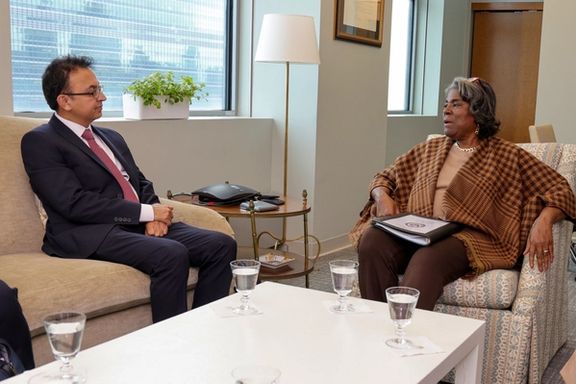
The United States is apparently pushing the United Nations to hold the Islamic Republic accountable for its violent crackdown on antigovernment protests.
During a meeting on Wednesday the US Ambassador to UN Linda Thomas-Greenfield and Javaid Rehman, the UN Special Rapporteur on the Human Rights Situation in Iran reiterated calls for an independent investigation to hold those responsible for the violence being carried out by the government of Iran accountable.
Appreciating the Special Rapporteur’s reporting on the human rights situation, the US ambassador especially thanked Rehman for his work to highlight Iran’s continuing repression of peaceful protesters and the rights of women and girls.
Ambassador Thomas-Greenfield repeated Washington’s stance that it will “continue to stand with the brave Iranian people as they call for equal rights and basic human dignity.”
Earlier this month, White House National Security Advisor Jake Sullivan said that the entire world is watching the current situation in Iran, reiterating that the United States stands with the Iranians.
Washington on October 6 imposed sanctions on seven Iranian officials over the shutdown of internet access and the crackdown on peaceful protesters. The EU is also putting significant pressure on Iran to stop Tehran from mistreatment of citizens.
Since the protests started over the death in custody of 22-year-old Mahsa Amini, several human rights bodies and NGOs have called on the international community to "support calls for the establishment of an independent international investigative and accountability mechanism to address the prevailing crisis of impunity in Iran."

Defiance of a rule that requires male and female students eat separately in canteens spreads in Iranian universities as civil disobedience to gender apartheid.
On October 4, a few brave female students of the literature and languages faculty of Allameh Tabatabi University in Tehran removed their headscarves, marched into the boys’ canteen, and sat to eat after protesting and chanting outside for hours and more female students joined in.
The move was welcomed by everyone, who chanted “Women, Life, Freedom” and clapped as a short video posted on Twitter showed. Students have been eating together there since the taboo was broken, despite threats of disciplinary action and even expulsion.
Students in many other universities have followed suit as canteens were “reclaimed” as students say. But in some universities, there have been stand offs with authorities and hardliner students who often belong to the student wing of the Revolutionary Guards’ Basij militia.
Wherever students are being barred from dining together, they stage protests outside the buildings and chanting slogans, waving their headscarves above their heads.
In some universities students are taking their food trays outside to eat together in the open or arranging the trays in a row on the ground and refusing to eat the food while chanting and protesting.
For four decades authorities have imposed gender-segregation in universities. Male and female students are required by an unwritten law to sit in two separate parts of classrooms and lecture halls, eat in separate canteens or in the same canteen but at different hours, exercise and compete in separate sports facilities, and live at separate dormitory buildings unless they reside in dormitories allocated to married students.
In the religious city of Qom which is also home to many seminaries, students’ insistence on breaking the segregation taboo ended in a standoff with school security on Tuesday, who closed the canteen door to stop boys and girls from entering together.
After some chanting, students tried to force their way in but security used violence against the students who did not give up and finally went in to buy their food. They took their trays out and had a huge picnic outside, defying segregation.
On Monday at Sharif Industrial University in Tehran cafeteria chairs, tables, and windows were broken during a standoff between protesters and Basij members. Protesting students said on social media later that they had tidied the place up after the standoff and set up a fund for replacing damaged furniture.
Meanwhile, the Basij students took to the memorial of unknown soldiers buried inside the university and mourned what they considered as sacrilege against those martyred for Islam and Islamic laws.
Photos posted on Twitter show several Basij students laying their heads on the tomb of an unknown soldier and crying. The remains of three unknown soldiers of the Iran-Iraq War (1980-1988) were buried on the campus in 2006 despite the opposition of over 80 percent of students who voted against it in a poll. Those opposed argued that insistence by hardliners to bury the unknown soldiers inside the campus was a symbol of their political dominance.
Videos posted on social media Tuesday showed TV football commentator and producer Adel Ferdosipour, who also teaches English at Sharif Industrial University, joining students’ sit-in/picnic outside the canteen in a display of support and solidarity, which students hugely welcomed. Ferdosipour who enjoys popularity among Iranians for his honesty and open criticism of the hardliner establishment was included in Newsweek’s list of the 20 most powerful Iranians in 2009.